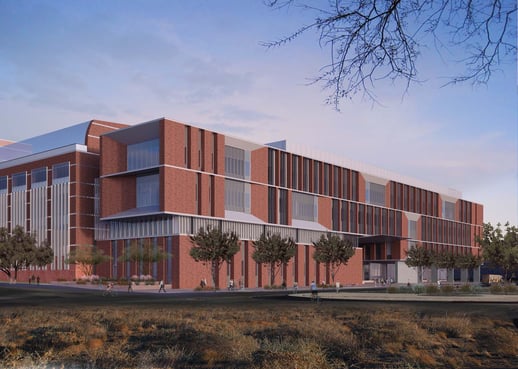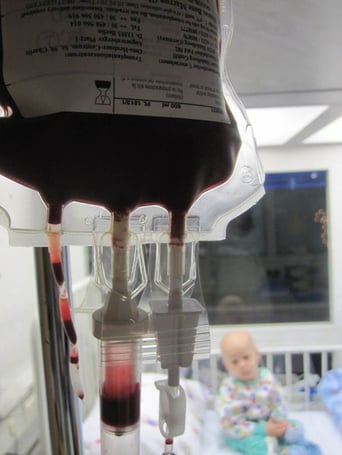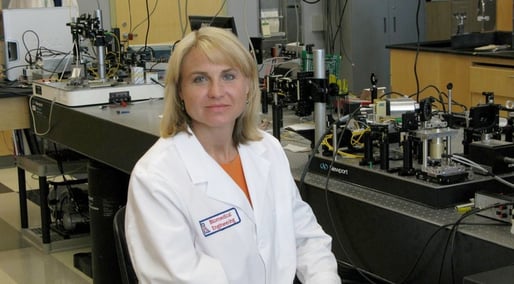The National Institutes of Health (NIH) awards the University of Arizona roughly 200 grants totaling about $100 million each year. In 2018 the numbers increased to 266 grants totaling $125,091,695. A large portion of this NIH research funding was awarded to the over 250 scientists included in the University's BIO5 Institute. Here are the top 10 BIO5 NIH grant recipients:
Read MoreTags: biomedical research, Biotech Event, Alzheimer's Research, UAZ, Research Funding, NIH funding, NIH grant, University of Arizona Tucson, UA, cancer research funding, cancer research grant, Asthma research, BioResearch Product Faire™, Cancer Diagnostics, cytomegalovirus, Valley Fever, virus research, BIO5 Institute
Ovarian cancer has a mortality rate of up to 70%. This is partly due to the fact that the disease is rarely detected in its early stages because the symptoms are vague and nonspecific. Currently, there is no accepted screening method for ovarian cancer. Due to the mortality rate, physicians often counsel women at high risk to have their ovaries and fallopian tubes removed as a precaution. Jennifer Barton, director of University of Arizona’s BIO5 Institute wants to change all this. With $863,000 from the United States Army and nearly $500,000 from the NIH in research funding, her plans for a falloposcope that will detect early-stage ovarian cancer is moving forward.
Read MoreTags: biomedical research, Biotech Event, UAZ, Research Funding, NIH funding, NIH grant, University of Arizona Tucson, UA, cancer research funding, cancer research grant, ovarian cancer, BioResearch Product Faire™, Cancer Diagnostics, NIDA, BIO5 Institute
The University of Arizona Health Sciences-Banner Health has received the largest National Institute of Health (NIH) grant award in the state’s history. The $60 million, five-year award will fund the university’s All of Us Research Program, which will include Hispanic/Latino and American Indian/Alaskan Native participants and communities.
Read MoreTags: biomedical research, Biotech Event, UAZ, Research Funding, NIH funding, NIH grant, University of Arizona Tucson, UA, BioResearch Product Faire™
Construction of the new Bioscience Research Laboratories (BSRL) building at the University of Arizona, Tucson will soon be entering its final phase. This $107,5000,000 project began in December of 2015 and is expected to be completed in December of this year. The new four story, 100,000-square-foot biomedical building will be located along Cherry Ave, adjacent to the Keating BIO5 and the Medical Research Building. It will house imaging, the CLIA genetics core facility, informatics, and wet lab space.

(Image of the Bioscience Research Building courtesy of University of Arizona)
Read MoreTags: Biotechnology vendor show, University of Arizona Tucson Research, UAZ, Laboratory Equipment Supplier, UA, BioResearch Product Faire, science building, medical research building
The National Institute of Aging has awarded a five year, $10.3 million grant to the University of Arizona, Tucson to fund research on why women are more susceptible to developing Alzheimer's Disease than men are. Lead researcher Dr. Roberta Diaz Brinton will be collaborating with other UA investigators, as well as with researchers at the University of Southern California with specialties including; neuroimaging and informatics, pharmacology, gerontology, and neuroradiology.
-MRI-1.png?width=248&name=Cerebral_amyloid_angiopathy_(CAA)-MRI-1.png)
(Image of brain affected byAlzheimer's courtesy of Wikimedia Commons)
Read MoreTags: Bioresearch funding, Biotechnology vendor show, University of Arizona Tucson Research, Alzheimer' Research, University of Arizona Tucson, UA
A study by University of Arizona ecologists explored how global warming could jeopardize our food supply. In their report, Alice Cang and John Wiens, professor at UA’s Department of Evolutionary Biology, conclude that grasses across the globe may be unable to keep pace with climate change. This will put some of the world's most critical food sources such as wheat, corn, and rice in danger.
Read MoreTags: University of Arizona, Arizona, Biotechnology Vendor Fair, Ecology, biotech vendor show, Southwest Region, UA, Global Warming, Climate Change
The National Institute of Health awarded a five year, $7 million grant to Dr. Monica Kraft at the University of Arizona College of Medicine – Tucson. The funding will support a research study titled, “Dysfunction of Innate Immunity in Asthma,” which will seek to improve our understanding of mediators that help control lung inflammation. This in turn may lead to improved therapies for reducing severe asthma attacks.
Read MoreTags: biomedical research, Biotech Event, UAZ, Research Funding, NIH grant, University of Arizona Tucson, UA, Asthma research, BioResearch Product Faire™

(Image courtesy of Wikimedia Commons)
Finding matching donors for patients who need bone marrow transplants can be challenging. For ethnic minorities the chances of finding an unrelated donor who is a match through the national donor registry is less than 35 percent. However, thanks to a three year, $600,000 grant from the Leukemia and Lymphoma Society researchers and physicians at the University of Arizona-Tucson are hoping to improve the odds of survival for those patients. This new research funding will be used to support ongoing biomedical research at the UA Steele Children’s Research Center into improving haploidentical bone marrow transplantations (haplo-BMT) as well as launching clinical trials at the UA Cancer Center.
Read MoreTags: Biomedical Reearch, University of Arizona Tucson, UA, research grants, BioResearch Fair, Bone marrow transplants
 (Dr. Barton, researcher at the University of Arizona. Photo courtesy of U of A)
(Dr. Barton, researcher at the University of Arizona. Photo courtesy of U of A)
The National Cancer Institute is funding a million dollar study at the University of Arizona to help detect ovarian cancer sooner. It is hoped this project will lead to the first effective screening test for a disease that kills 14,000 women a year and often gives little to no warning of its presence until it’s too late.
Read MoreTags: University of Arizona, University of Arizona Tucson Research, Arizona, UAZ, Biotechnology Vendor Fair, Research Funding, Tucson, University of Arizona Tucson, UA, ovarian cancer, 2016, cancer reserach, Dr. Jennifer Barton, Optical imaging technology
The summer of 2012 is set to go down as one of the driest and worst years for US farmers, but it's proving to be an excellent season for fruit science, especially at the University of Arizona, Tucson. In June we saw the sequencing of the tomato genome (technically a fruit), which was a breakthrough in genetics research. The Arizona Genomics Institute has now cracked another complex code: the genome of the banana.
Tags: University of Arizona, DNA Sequencing, genomic research, DNA Research, genome research, banana, University of Arizona Tucson Research, Southwest, 2012, biology research, Arizona, AZ, Genetics, Front Line event, genomics research, Tucson, UA

